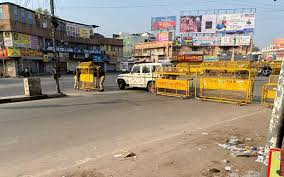Trade unions forum calls for Bharat Bandh against govt policies tomorrow

India is set for a major nationwide shutdown on July 9, 2025, as over 25 crore workers prepare to join the Bharat Bandh. Ten central trade unions have called for this strike to oppose what they call pro-corporate and anti-worker policies implemented by the central government.
Farmer groups, students, and informal workers have also declared their support, turning this into a massive cross-sector movement.
Why Bharat Bandh Is Taking Place
Trade unions have strongly criticised the government for ignoring their demands and weakening labour rights. Instead of consulting stakeholders, the government passed four controversial labour codes. These new laws, according to unions, reduce job security, limit collective bargaining, and increase exploitation.
Moreover, the government hasn’t held the Indian Labour Conference for more than ten years. This gap in dialogue has angered workers who say the state is neglecting their concerns. They argue that economic reforms have only benefited large corporations, leaving workers more vulnerable than ever.
Key Demands of the Trade Unions
The protesting unions have made several urgent demands. These include:
- Repeal the four labour codes immediately.
- End the privatisation of public sector undertakings.
- Guarantee minimum wages across all sectors.
- Strengthen pension schemes and social security for all.
- Expand job opportunities for youth.
- Provide legal rights to informal and gig workers.
Importantly, these demands are not new. The unions submitted a 17-point charter long ago. However, the government has shown little interest in responding to their requests.
Widespread Impact Expected
This Bharat Bandh is likely to disrupt services across the country. Here’s what to expect:
- Banks: Public sector bank branches may remain closed.
- Transport: Bus, taxi, and auto services could stay off the roads.
- Postal Services: India Post operations might see reduced staffing.
- Power and Coal: Workers in coal and electricity sectors are participating, which could lead to temporary slowdowns.
- Schools and Colleges: These institutions will stay open, though transport challenges may cause low attendance.
In states like West Bengal, Tamil Nadu, Kerala, and Assam, protests and rallies will occur in many districts. For instance, Assam will witness a 24-hour transport strike beginning early morning. In contrast, some state governments have warned against disruptions and are preparing to ensure order.
Farmer Support Strengthens the Movement
Farmers from across India are joining this protest. Samyukta Kisan Morcha (SKM) and other rural organisations plan village-level protests in solidarity.
Their concerns echo those of the workers. Rising input costs, lack of procurement guarantees, and fewer employment options in rural areas have created immense pressure. Therefore, their collaboration with labour unions gives this strike broader reach and legitimacy.
Government Response
The central government has not yet initiated dialogue with union leaders. It continues to defend its economic reforms, arguing that these policies aim to improve efficiency and attract investment.
Meanwhile, several states have advised public employees not to participate in the bandh. Police and civic authorities are on alert to manage crowd control and maintain peace.
A Larger Movement Beyond One Day
While this strike is limited to one day, its implications go far beyond July 9. Workers and farmers alike are voicing frustration with an economic system they feel excludes them.
This movement signals a deeper shift—people are demanding a fairer, more inclusive economy. They want stronger public institutions, stable jobs, and respectful dialogue.
Moreover, this strike may inspire future collective actions if the government continues to avoid discussion. Past nationwide protests have, after all, led to policy reversals and legal changes.
Conclusion
The Bharat Bandh on July 9, 2025, is more than just a shutdown—it is a cry for justice. Workers, farmers, and youth have united to demand a change in direction. Their message is clear: India’s future must include its labour force, not bypass it.
Whether this call results in reforms or not, the people’s voice is loud—and growing louder.






